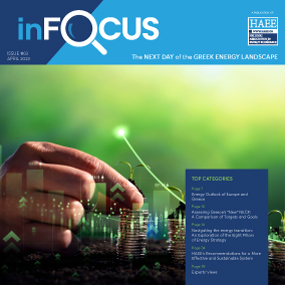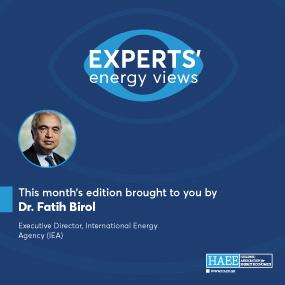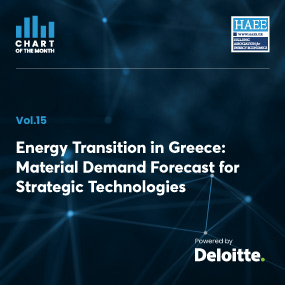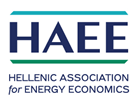
📢 Highlight
The 8th HAEE Energy Transition Symposium has been rescheduled for September 27-29, 2023 and it will be hosted at the French Institute of Greece, gathering personalities from across levels, triggering discussions that will make an impact in the energy world. As for the academic pillar of the Symposium, the Call for Papers is open, accepting submissions. Review the list of topics to be addressed and submit your abstract until June 6, 2023. In HAEE's effort to always award excellence, the Organizing Committe is pleased to announce the Best Paper and the Best Student Paper Awards for the authors who will present the most novel advances in the broad field of energy transition. Visit HAEE's website for more information on the application procedure.
⚡ Energy Insights
Energy Policy Review – Greece 2023 Greece aims to decrease total greenhouse gas emissions by 55% by 2030 and achieve net zero emissions by 2050. Greece has achieved significant progress in renewable energy, accounting for 20% of total final energy consumption in 2021. Despite these noteworthy achievements, significant challenges remain. Fossil fuels continue to account for the majority of Greece's energy use, and greater emphasis on energy efficiency is required. Energy Policy Review – Greece 2023 provides a range of energy policy proposals to assist Greece in effectively shifting to a secure, efficient, and flexible carbon-neutral energy system. Global EV Outlook 2023 Electric vehicle markets are expanding at an exponential rate, with sales exceeding 10 million by 2022. Electric vehicle sales are predicted to remain strong through 2023. There are promising signs for emerging electric vehicle (EV) markets, albeit from a small base. Market trends and policy efforts in major car markets are supporting a bright outlook for EV sales while battery manufacturing continues to expand. Global EV Outlook 2023 identifies and discusses significant global advancements in electric mobility across the globe. The report includes analysis of lessons learned from leading markets to inform policy makers and stakeholders about policy frameworks and market systems for electric vehicle adoption. Financing the Transition: Energy Supply Investment and Bank Financing Activity According to BloombergNEF's annual Energy Transition Investment Trends report, investment in low-carbon energy supply would increase by 15% to $550 billion in 2022. This is the fastest rate of growth since 2015. While a surge in fossil-fuel investment is expected to compensate for the disruption caused by Russia's invasion of Ukraine, the underlying economics of low-carbon energy supply indicate that it will continue to grow. Financing the Transition: Energy Supply Investment and Bank Financing Activity examines banks' energy sector financing activities in 2021 and its allocation between low-carbon supply and fossil fuels. By generating a ratio for this, one can approximate the extent to which banks’ financing activity is aligned to investment in the real economy and by extension to that needed by 1.5°C-aligned climate scenarios. EU imports of energy products - recent developments Russia was the EU's primary supplier of petroleum products and natural gas until the end of 2021. Following Russia's invasion of Ukraine, the European Union responded with a series of sanctions affecting both direct and indirect oil and natural gas trade. A significant diversion of trade in energy products began to develop gradually in 2022. EU imports of energy products provides a picture of trade in energy products between the European Union (EU) and the rest of the world (extra-EU trade). The analysis focuses on yearly data for the period 2018-2022, with a view on the quarters of 2022, thus reflecting the most recent developments. Supply chain analysis and material demand forecast in strategic technologies and sectors in the EU The European Union requires continuous access to critical raw materials and numerous products containing them to meet the ambitious targets it has set for energy and digital transitions, as well as its defense and space agenda. This foresight study provides a systematic and detailed analysis of the entire value chains, from raw and processed materials to components, assemblies, and systems, for 15 key technologies across the five strategic sectors that are responsible for delivering these targets.
📰 Energy Market News
Last year the European economy was faced with the shock of reduced natural gas supply as a result of the war in Ukraine. This year, the continent may find itself faced with another threat: Reduced water levels and high temperatures. Meteorological predictions speak already of El Nino return, a phenomenon usually associated with high global temperatures. At the same time, the warm winter of 2022-2023 facilitated Europe's effort to face the energy crisis and avoid shortfalls, but it also has the effect of reducing water levels in rivers and dams. Moreover, the ability of hydroelectric plants to cover gaps in the system are reduced, as well as pump-hydro's ability to act as a giant battery and support power production. We should also add the fact that higher temperatures during summer months result higher demand for electricity. All the above constitute a complicated picture that every operator, government and the EU itself may have to face this year.
📘 In Review
After having set its own course for a whole year, analysing and visualising data of the most intriguing energy trends, HAEE's Chart of the Month is now powered by Deloitte. For months February and March, HAEE's scientific team chose to bring forward "An Energy Economic Perspective of EV charging in Greece" and "Material Demand Forecast for Strategic Energy Transition Technologies" respectively. Get access to both, Vol. 14 and Vol. 15, below!
HAEE's series "Experts' Views" offers its Members and friends the most stimulating contributions by top energy experts. The latest opinion articles were brought by Dr. Athanasios Dagoumas, President of the Regulatory Authority of Greece, and Dr. Fatih Birol, Executive Director of the International Energy Agency.
The 3rd issue of In Focus is entitled “The Next Day of the Greek Energy Landscape” and focuses on the "new" NECP aims and national objectives are impacting the future of the Greek energy landscape. Ιt explores the "future" of the eight pillars of energy strategy (fossil fuels, solar and onshore wind, offshore wind, green hydrogen, energy storage, grid/interconnections, energy efficiency, and e-mobility), the investments and the projects planned for the near future. The issue concludes with recommendations that address several different areas for achieving a more effective and sustainable energy system. A special thanks to our Members - Deloitte, EDP Renewables, Enel Green Power, EnEx Group, Exergia, Gears, PPC Renewables (PPCR), Trans Adriatic Pipeline (TAP), TÜV HELLAS (TÜV NORD) S.A.- for elevating the new In Focus issue with an input of inestimable value and expertise. The standard version of the report, including the valuable contributions of our Members as well as the first chapter of the issue that refers to the Energy Outlook of Europe and Greece is open to all. The full version, including 3 more chapters assessing Greece's new NECP targets, exploring the eight pillars of Energy Strategy and finally providing recommendations for a more effective and sustainable energy system, is available only for HAEE Members. Enjoy reading!
👨👦👦 Join us!
Register now and be part of our community to get access to a vast network of energy experts and professionals and to receive the latest and most accurate information on energy advances.
✨ Cherry-picked
|



